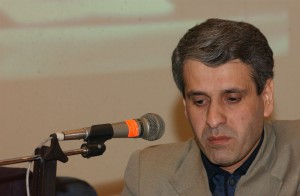Civil Society Activist Sentenced to 20 Years in Prison and €550,000 in Fines
The International Campaign for Human Rights in Iran has learned that former Allameh Tabatabaee faculty member and head of Volunteer Actors Institute Sohrab Razzaghi has been tried in absentia and sentenced to 20 years in prison and €550,000 ($760,705) in fines.
“This is the harshest and most inhumane sentence handed out to an Iranian civil society activist,” Razzaghi told the Campaign. “But it is not possible to appeal this sentence. For one thing, my lawyer, Abdolfattah Soltani, is in prison himself, and for another, the sentence stipulates that an appeal is conditional upon my appearance in court,” he continued.
On 24 October 2007, security forces arrested Razzaghi when he was leaving the country to attend a conference organized by a human rights NGO in Dublin, Ireland. He spent a month in solitary confinement in Ward 209 of Evin Prison without access to his lawyers, Shirin Ebadi and Abdolfattah Soltani.
“During my interrogations and afterwards, they never presented any evidence against me and I did not accept any of the charges,” Razzaghi told the Campaign. He was released after one month on the heavy bail of $200,000.
After the 12 June 2009 election, Razzaghi was summoned to Branch 15 of the Tehran Revolutionary Court, but he refrained from appearing in court and left the country after a short time. During the group trial of the post-election detainees, Sohrab Razzaghi’s name was mentioned in the group indictment, and he was referred to as “one of the elements and leaders of a color revolution in Iran.” Some post-election detainees were also made to make false confessions against him.
“I did not appear at Evin Prison for my sentence implementation,” Razzaghi told the Campaign. On 9 November 2011, Razzaghi’s family received a letter from the judiciary stating that Judge Salavati, Head of Branch 15 of Tehran Revolutionary Court, had sentenced him to 20 years in prison and a fine of €550,000. “They confiscated my bail collateral sum of 200 million tooman [$200,000], and they have filed a judicial motion for the remaining fine,” Razzaghi said.
Formerly a professor at Allameh Tabatabaee’s Law and Political Science College, Razzaghi was dismissed in 2005 during the first wave of reformist and critical faculty members’ dismissals.
From 2001 until 2007, Razzaghi headed the Volunteer Actors Institute, a non-profit organization dedicated to educational, research, and capacity building of activists and civil society organizations. The Institute’s activities were committed to deepening the Iranian civil society, promoting democracy, human rights, and sustainable development. The Institute was one of the most important centers for civil capacity building, promotion, support, and training in Iranian civil society.
“All the money the Volunteer Actors Institute received in five years from UN organizations such as UNICEF, and agencies such as Hivos and Internews Europe, was €550,000,” the precise amount of the court-ordered fine, Razzaghi explained.
In March 2007, without stating any charges or asking any questions about the organization’s activities, Iranian security forces closed and sealed off the offices of the Volunteer Actors Institute. They then raided and searched Razzaghi’s home, taking Razzaghi’s personal documents, books, notes, CDs, and personal computer after hours of searching. Simultaneously, all of the Institute’s bank accounts were frozen, along with Razzaghi’s personal bank accounts. The accounts remain frozen without any judicial ruling.
In its indictment, the Revolutionary Court waged the following accusations against Razzaghi:
– Forming a group with the intent to overthrow the regime and act against national security
– Keeping top secret information in order to make the same available to foreigners
– Collusion with the intent to overthrow and act against national security
– Receiving funds from international organizations
All activities performed by the Volunteer Actors Institute revolved around subjects such as training for democracy, human rights work, capacity building for activists and civil society organizations, and cooperation with civil movements, such as the women’s movement. The Institute routinely informed the authorities prior to receiving funds from non-Iranian sources. It was also audited annually by a reputable Iranian audit firm, and its financial reports were published annually.
“All the documents and expenditures are … available,” Razzaghi told the Campaign. “I am paying the fines.”

